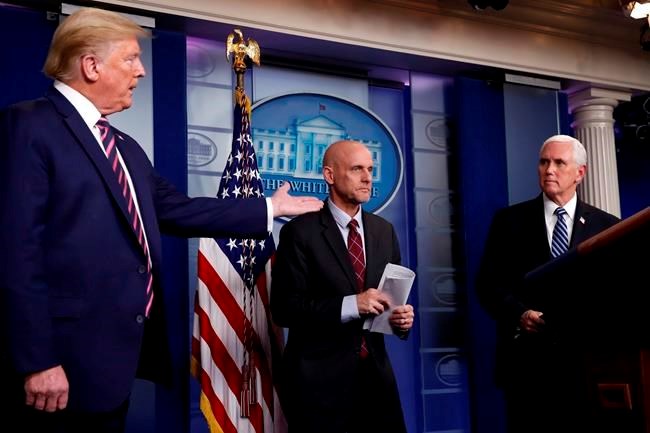WASHINGTON — Hours before the Food and Drug Administration authorized the first COVD-19 vaccine late Friday, a high-ranking White House official told the agency’s chief he could face firing if the vaccine was not cleared by day’s end, two administration officials said.
The FDA granted emergency use for the vaccine produced by Pfizer Inc. and its German partner BioNTech. The decision kicks off a massive vaccination effort to help defeat the pandemic. President Donald Trump said late Friday that Pfizer had “passed the gold standard of safety” and hailed the vaccine as “one of the greatest scientific accomplishments in history.”
But the move followed tense discussions between White House chief of staff Mark Meadows and FDA Commissioner Stephen Hahn, according to a senior administration official who was familiar with the call but was not authorized to discuss private conversations.
The chief of staff told Hahn his job was in jeopardy if the emergency use authorization was not issued before Saturday, said a second administration official familiar with the conversation.
Earlier in the day Hahn had issued a statement indicating the agency was working rapidly to clear the vaccine.
Friday’s threat marked the latest attempt by the Trump administration to override government scientists working to combat the deadly pandemic. Even with an FDA decision expected within hours, Trump and his deputies proved unwilling to let regulators work through their careful review, which includes drafting safety warning labels and instructions for physicians.
It was unclear whether authorizing the vaccine Friday night will meaningfully expedite its rollout.
Trump tweeted directly at Hahn earlier Friday, complaining that FDA “is still a big, old, slow turtle.” Trump has publicly bashed the pace of the FDA's vaccine review process.
“Get the dam vaccines out NOW, Dr. Hahn,” Trump tweeted Friday. “Stop playing games and start saving lives.”
Hahn disputed characterizations of his conversation with Meadows.
“This is an untrue representation of the phone call with the Chief of Staff," Hahn said in a statement. "The FDA was encouraged to continue working expeditiously on Pfizer-BioNTech’s EUA request. FDA is committed to issuing this authorization quickly, as we noted in our statement this morning.”
The FDA said earlier Friday that it "will rapidly work” to grant emergency use of the vaccine.
Dr. Ashish Jha, dean of Brown University’s school of public health, called the pressure an “unforced error” by the White House that could chip away at public confidence in a vaccine.
“It creates a veneer of political meddling,” Jha said. “Every time you see the president get involved, you see vaccine confidence drop by 10%.”
Hahn and other top health officials have been working for months to boost public confidence in the government’s vaccine effort, which will eventually need to reach most Americans to suppress the virus.
Recent polls show only about half of all Americans are ready to roll up their sleeves for a shot. Many have safety concerns and want to wait and see how the initial rollout fares. But concerns that a vaccine was rushed due to political pressure could further undermine the unprecedented vaccination effort.
“The last thing this process needs now is to undermine the public’s faith in the vaccine with political pressure to hurry up an already rushed process with threats of firings,” said Carl Tobias, law professor at the University of Richmond in Virginia.
Jha added that FDA officials don't need the added pressure. “They already feel the weight of what’s happening in our country," he said.
Trump’s frustration with the FDA has been mounting, particularly as other countries have beaten the U.S. in issuing emergency approvals for the vaccine. Meadows issued the ultimatum to Hahn at Trump's direction, a senior administration official said.
The FDA decision — when it comes — will kickstart an unprecedented vaccination campaign needed to eventually defeat the virus, now blamed for nearly 300,000 deaths in the U.S. And the agency's greenlight of the vaccine was virtually assured after Thursday's positive vote by agency advisers.
The FDA’s review is critical to assuring the safety and effectiveness of a vaccine that will eventually be given to many millions of Americans..
Among the final issues facing FDA scientists are whether to authorize the shot for use in pregnant women and teenagers, who were not extensively studied in Pfizer's trial.
The agency’s careful approach is unique around the world in that the FDA actually reanalyzes all company data to verify its accuracy. That’s different from the abbreviated process used by the U.K. and other countries, which rely on summary data produced by manufacturers.
Hahn has stated for months that “science, not politics” would determine when the agency gives the vaccine the go-ahead.
More than 150 FDA staffers have been working in shifts over nights, weekends and the Thanksgiving holiday to review tens of thousands of pages of Pfizer’s application.
Hahn told The Associated Press earlier this week that his agency had already teed up authorization by prefilling all the necessary legal paperwork.
“We’re doing everything we can to cut down on the red tape, which I think is really important,” Hahn told the AP.
Trump has been livid with the FDA for not moving faster to approve the shots, blaming the fact that a vaccine was not available before the Nov. 3 election for his loss. Trump also has
As he has refused to accept his loss to Democratic President-elect Joe Biden, Trump also has told close confidants that he believes the vaccine is still being slow-walked in a bid to undermine his efforts to challenge the results.
If the vaccine were shipped out sooner, he has argued, it would rally public opinion to his side.
___
Lemire reported from Wilmington, Del. Associated Press writer Zeke Miller contributed to this report.
Jonathan Lemire, Darlene Superville And Matthew Perrone, The Associated Press


